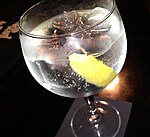
A Manhattan is a cocktail made with whiskey, sweet vermouth, and bitters. While rye is the traditional whiskey of choice, other commonly used whiskies include Canadian whisky, bourbon, blended whiskey, and Tennessee whiskey. The cocktail is usually stirred with ice then strained into a chilled cocktail glass and garnished traditionally with a maraschino cherry. A Manhattan may also be served on the rocks in a lowball glass.
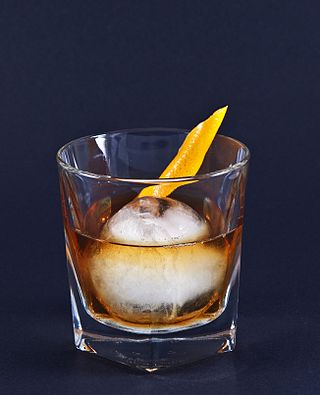
The old fashioned is a cocktail made by muddling sugar with bitters and water, adding whiskey, and garnishing with an orange slice or zest and a cocktail cherry. It is traditionally served with ice in an old fashioned glass.
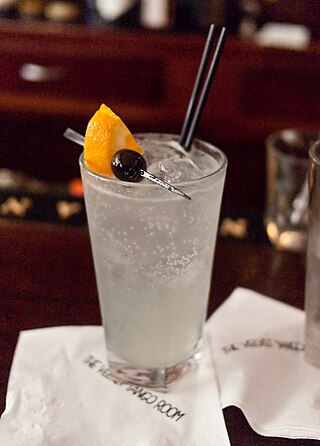
The Tom Collins is a Collins cocktail made from gin, lemon juice, sugar, and carbonated water. First memorialized in writing in 1876 by Jerry Thomas, "the father of American mixology", this "gin and sparkling lemonade" drink is typically served in a Collins glass over ice. A non-alcoholic "Collins mix" mixer is produced, enjoyed by some as a soft drink.
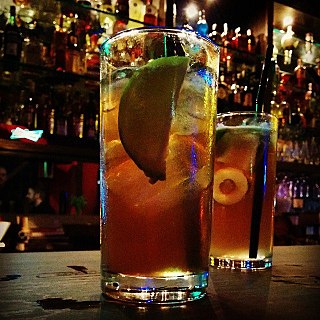
The Long Island iced tea, or Long Island ice tea, is an IBA official cocktail, typically made with vodka, tequila, light rum, triple sec, gin, and a splash of cola. Despite its name, the cocktail does not typically contain iced tea, but is named for having the same amber hue as iced tea.

A margarita is a cocktail consisting of tequila, triple sec, and lime juice. Some margarita recipes include simple syrup as well and are often served with salt on the rim of the glass. Margaritas can be served either shaken with ice, without ice, or blended with ice. Most bars serve margaritas in a stepped-diameter variant of a cocktail glass or champagne coupe called a margarita glass. The margarita is one of the world's most popular cocktails and the most popular tequila-based cocktail.

The sidecar is any cocktail traditionally made with cognac, orange liqueur, plus lemon juice. In its ingredients, the drink is perhaps most closely related to the older brandy crusta, which differs both in presentation and in proportions of its components.

The martini is a cocktail made with gin and vermouth, and garnished with an olive or a lemon twist. Over the years, the martini has become one of the best-known mixed alcoholic beverages. A popular variation, the vodka martini, uses vodka instead of gin for the cocktail's base spirit.
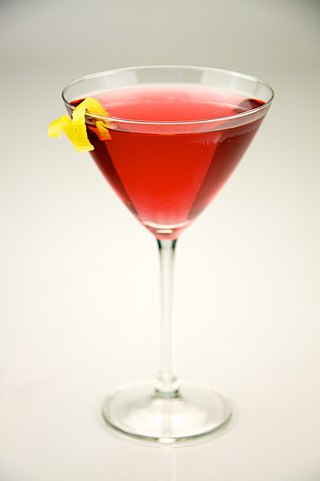
A cosmopolitan, or, informally, a cosmo, is a cocktail made with vodka, Cointreau, cranberry juice, and freshly squeezed or sweetened lime juice.

A sour is a traditional family of mixed drinks. Sours belong to one of the old families of original cocktails and are described by Jerry Thomas in his 1862 book How to Mix Drinks.

The Prince of Wales is a cocktail created by Albert Edward, Prince of Wales, who later became King Edward VII. There are several variations of the cocktail, but what they usually have in common is champagne, angostura bitters, sugar, either rye whiskey or cognac, and a liqueur.
A Scorpion Bowl is a communally shared alcoholic tiki drink served in a large ceramic bowl traditionally decorated with wahine or hula-girl island scenes and meant to be drunk through long straws. Bowl shapes and decorations can vary considerably. Starting off as a single-serve drink known as the Scorpion cocktail, its immense popularity as a bowl drink in tiki culture is attributed to Trader Vic.

The Fine Art of Mixing Drinks is a book about cocktails by David A. Embury, first published in 1948. The book is noteworthy for its witty, highly opinionated and conversational tone, as well as its categorization of cocktails into two main types: aromatic and sour; its categorization of ingredients into three categories: the base, modifying agents, and special flavorings and coloring agents; and its 1:2:8 ratio for sour type cocktails.
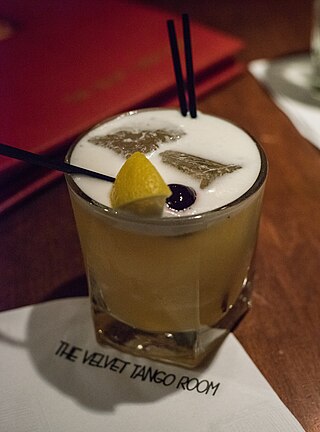
An amaretto sour is a cocktail using amaretto liqueur. It is a type of sour, a mixed drink made with a base spirit, citrus juice, and a sweetener. The drink is the most popular cocktail use for amaretto.

A "fizz" is a mixed drink variation on the older sours family of cocktail. Its defining features are an acidic juice and carbonated water. It typically includes gin or rum as its alcoholic ingredient.
An astro pop cocktail is a layered cocktail, mixed drink or shooter so named because it resembles the Astro Pop lollipop candy brand. Various recipes exist that use liquor and liqueurs to produce the drink. A version of the drink exists that is layered with red, white, and blue colors and served in a shot glass. It is a popular alcoholic beverage in some drinking establishments.

The doctor cocktail is a pre-prohibition era cocktail that traces in drink guides to as far back as 1917, when it appeared in Hugo R. Ensslin's Recipes for Mixed Drinks. As originally described the cocktail called simply for Swedish Punsch mixed with lime juice.
The test pilot cocktail is a vintage tiki drink invented by Donn Beach. Beach was known for changing his recipes over time, and multiple versions of the test pilot attributed to both him and others make the cocktail one of his more frequently imitated and varied tiki drinks. Test pilot recipes call for multiple rums and typically include the use of falernum syrup and lime juice. The more popular also include Pernod (pastis/absinthe) and bitters.
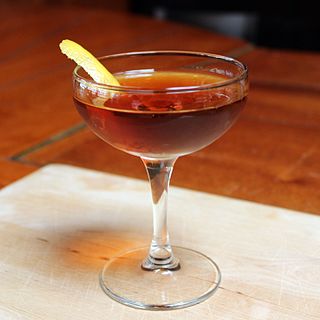
The Martinez is a classic cocktail that is widely regarded as the direct precursor to the Martini. It serves as the basis for many modern cocktails, and several different versions of the original exist. These are generally distinguished by the accompaniment of either Maraschino or Curacao, as well as differences in gin or bitters.
















